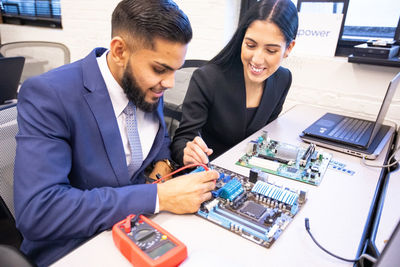At LEO, our commitment to evidence is unwavering[1]. Over the past two months, our partners—nonprofits who support those experiencing poverty—have faced an unprecedented test. As many fight for survival, we at LEO have been amazed by their resilience and ongoing commitment to evidence. In this series, we’ll highlight the stories of these nonprofits to showcase how they are adapting to the realities of COVID-19, and the innovations of those on the front lines of the war on poverty.
Read the stories from Helping Restore Ability and i.c.stars.
--------
“COVID wrecked our flow”: How a team of social workers, educators, and technologists transforms lives in uncertain times
You don’t have to spend a lot of time on the phone with the VPs at NPower to understand the infectious energy that pervades the organization. Despite COVID disrupting almost every aspect of their organization, you’ll still get a joke about how doing something easier “wouldn’t be as fun.”
For almost twenty years, NPower has equipped young adults and veterans with the tech skills needed to move into the middle class. In 2019, NPower partnered with LEO to conduct the first rigorous evaluation of its popular education and internship program.
Started in 2002, the Brooklyn-based nonprofit operates in seven states and in Canada. NPower believes that the fastest route out of poverty is participation in the tech sector; 77% of all jobs require technical skills in the US in 2020. However, two core groups are being left out of this growth: youth from underserved communities and veterans.
NPower employs a holistic approach. On-site social workers attend to students’ “bio-psycho-social” needs. Trainers facilitate an intense three-month tech skills boot camp, and counselors establish relationships and internships with local employers. As a result, 80% of those who start the program finish with a job in hand, making ~50% more than they had previously.
But COVID has shaken almost every part of NPower's model to its core. At least 1 out of 7 of their students lacks access to technology at their home to complete the coursework. Many are single parents, and their homes can’t provide the time and environment necessary to participate. Even as NPower migrates classes online, will they be as effective? For those who graduate, will the jobs be there?
LEO partnership
As NPower sought to expand across the country, increasingly funders inquired about the evidence behind their approach. Despite being a data-driven organization--they capture completion rates, certification levels, and changes in income--NPower had never done a rigorous study of its programming. Not only are randomized controlled trials (RCTs) expensive to conduct, they require access to data outside the scope of the program. It was hard enough to track the income of a person who graduated from the program, let alone someone who didn’t even attend.
Together with LEO, they designed an approach to effectively measure a suite of post-program outcomes. LEO helped to randomize applicants, and to track those who were not selected for the program to answer the question on everyone’s mind: were the type of students who applied for NPower destined to succeed regardless?

NPower in the new normal
Within a week of the stay-at-home orders, which hit their Harlem campus especially hard, NPower was able to successfully convert 96% of their 375 students to virtual learning. They’ve also been able to provide emergency financial support, through the generous and timely support of their donors. But existential questions remain: how long can they afford to pay their brick and mortar leases across ten locations? Should in-person remain a core strategy for change? How can they address the invisible barriers which prevent those who lack access to technology in the home from participating fully in classes?
NPower and LEO’s original research plan remains in place, and on track for their 2021 classes and beyond.The world is changing quickly, and NPower sees tremendous opportunity in moving to virtual learning. Their graduates could access further certifications remotely over the course of their career. Or, a hybrid in-person model could enable them to scale much more quickly. Importantly, NPower realizes that these questions are all a matter of opinion unless they’re backed up by evidence.
NPower believes that while talent is universal, opportunity is not. During uncertain times, they’re sure that their graduates will make an immediate impact on the companies they join. If it were any easier, it wouldn’t be any fun.
-------
[1] Not only is it in our DNA... what would our 6 full time and over 30 affiliate professors at Universities across the country do if they couldn’t research?!